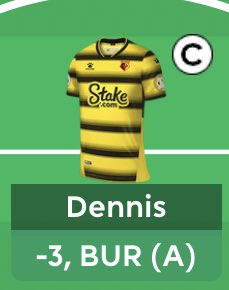“Double Gameweeks are a great source of points and provide an opportunity to inflict some damage to some of your less studious mini-league opponents. They have been profitable for me in the past and I am certainly looking forward to them in the coming weeks.”
“I have never been obsessed with Double Gameweeks; I don’t think they’re something special, something over the game’s regular excitement. I would never pick players just because of [a Double Gameweek] but a player who I‘d like to have in my team anyway will likely be preferred to someone who I also want but has one fixture fewer.”
The sentiments above could easily have been taken from our own site today but were, in fact, lifted from a Scout Debate on Double Gameweeks some 14 years ago.
Everything from the chips and the pricing structure to the way bonus points are apportioned (bring back The Man in the Stand!) has changed over the last two decades but Double Gameweeks remain a constant, year after year; there has never been a Fantasy Premier League (FPL) season without one.
Double Gameweeks set the pulses racing like little else in the Fantasy world. They shape chip strategies, alter transfer plans, encourage points hits and can transform seasons – for good or for bad.
We’re in the midst of a ‘double’ as we speak, with the two matches last night and the one to come on Thursday likely dictacting whether Gameweek 34 has been a success or a failure for most FPL bosses.
Trapped in the midweek purgatory between deadlines, we decided to take a nostalgic trip down memory lane to look at the good, the bad and the Duffy of 20-odd years of Double Gameweeks.
WAY BACK WHEN

For as long as there has been Fantasy Premier League in its current guise, there have been Double Gameweeks.
Hell, Double Gameweeks are even older than Tino Livramento and Wilfried Gnonto.
The first Double Gameweek proper that we’ve encountered in our trawl back through the archives came in Gameweek 4 of 2002/03, which ought to have been Gameweek 10. Confused? You should be, as FPL officially started in mid-September in its inaugural campaign after a six-week ‘trial’.
Fulham and West Ham United were the two teams playing twice in that round of fixtures, with successive 1-0 wins for the Hammers seeing such luminaries as Scott Minto and Ian Pearce make that week’s Dream Team.

There was actually an earlier, unofficial Double Gameweek as part of the six-week trial period, which was classed as Pre-Season by the games-makers despite it featuring actual Premier League fixtures. FPL has come a long way since those amateurish days (insert joke here).
Manchester United and Middlesbrough played twice, a Ryan Giggs goal and a ‘Boro clean sheet helping two future national-team coaches to double-digit hauls.

Charlton Athletic’s Scott Parker was the first player to break the 20-point mark in a Double Gameweek later in the campaign.
THE EARLY SCOUT DAYS

Years 2002-2006 were the Dark Ages of the FPL annals, with historic season records not being retained, web archive records of limited help and Fantasy Football Scout not launching until 2007.
Scout was a no-frills, one-man enterprise in those days, back when ‘so rare’ only meant the frequency of Derby County’s top-flight wins.
The first mention of a ‘Double Gameweek’ from Mr Sutherns came ahead of Double Gameweek 14 of the 2007/08 season, when Scout’s founding father launched a poll on the upcoming double.
Typically, key Blackburn Rovers assets Benni McCarthy, Roque Santa Cruz and Christopher Samba all flopped in their Gameweek 14 double-header. Death, taxes, and disappointment in a Double Gameweek.
SNOW 1-0 DOUBLE GAMEWEEK

If you thought your Kevin De Bruyne no-show or Ederson benching in Gameweek 34 was bad luck, at least you didn’t have a Double Gameweek fixture wiped out entirely.
That’s what happened back in January 2010, when a flurry of snow caused the postponement of Arsenal v Bolton Wanderers, the second Double Gameweek 20 match for both clubs.
FPL managers had their best-laid plans ruined, with the Gunners’ Andrey Arshavin widely backed with the armband but blanking in a 4-1 win over Portsmouth before the winter weather wreaked havoc.
The postponed clash was swiftly rescheduled for Double Gameweek 22, with Arsenal and Bolton playing each other twice in successive matches, but not before a colleague of this writer (long-time readers of this site may remember his Scout alter-ego, Puffinboy) deleted his team in a fit of pique and never returned.
The 2009/10 campaign turned out to be quite the chaotic one as managers stocking up on Fulham and Stoke City assets also had the rug pulled from beneath them at very short notice.
More recently, of course, we had Double Gameweek 29 of the 2019/20 season curtailed when the positive Covid test of a Greek chairman ultimately caused the Man City v Arsenal game to be postponed and set the dominoes falling for a mid-season adjournment.
DOUBLE GAMEWEEK 1

What could be more exciting than a Double Gameweek? A Double Gameweek on the opening weekend of a new season, that’s what.
Engagement in FPL is always at its highest at the start of a campaign, before the inevitable cooling of interest in the winter months.
So every man and his dog was lumping on Chelsea and Reading assets ahead of Gameweek 1 of the 2012/13 campaign, a ‘double’ that came about because the Blues’ involvement in the UEFA Super Cup had necessitated a fixture change.
Fernando Torres being backed by over 50% of Captain Poll voters was evidence of how giddy everyone was getting, the declining Spaniard waiting till the 81st minute of Chelsea’s second Double Gameweek 1 fixture to find the net.
Good old Branislav Ivanovic was more reliable, scoring twice and keeping a clean sheet en route to a big haul.
Another Double Gameweek 1 happened for Chelsea the very next season, with Ivanovic once again on the scoresheet.
TRIPLE GAMEWEEKS

And what could be more exciting than a Double Gameweek on the opening weekend of a new season? A Triple Gameweek, that’s what.
That rarest of beasts, our last one was in Gameweek 35 of the 2020/21 campaign when Manchester United had to play three matches in five days thanks to the Old Trafford protests putting paid to their home fixture against Liverpool in May 2021.
No United player started all three games in that Gameweek and the tiring Red Devils lost two of their three fixtures but Bruno Fernandes and Mason Greenwood nonetheless chipped in with 19-point returns.

The Triple Gameweek hadn’t been previously seen since 2005/06; with time passing, some of us questioned whether it had even happened in the first place.
But the archived screenshot above is proof it did, with Middlesbrough – like United above – having to juggle three league fixtures in the space of five days.
There’s not much in the way of abiding memories from this ‘triple’, perhaps because we’ve blocked it out of our minds for a reason: ‘Boro scored only one goal across their three matches, losing their clean sheets in two games.
HAPPY MEMORIES

The hauls are what we hope for in a Double Gameweek and there have certainly been plenty down the years.
We have to start with Wayne Rooney‘s 32-pointer in Double Gameweek 22 of the 2009/10 campaign (above), his four goals against Hull City in Man Utd’s second fixture supplementing the two attacking returns he’d picked up against Burnley in the first game.
As far as we’re aware, that haul remains the biggest individual score in FPL history – at least in the post-2006 era.
Yaya Toure ran him close in 2013/14 when scoring just one point fewer, while Harry Kane matched Toure’s tally in Double Gameweek 37 of the 2016/17 campaign (below) when plundering four goals and an assist in a 6-1 demolition of Leicester City.

Sergio Aguero‘s 26 points in Gameweek 34 of 2015/16 evoke happy memories for many of us, with team-mate Aymeric Laporte proving to be a Double Gameweek specialist with three separate monster scores in 2018/19.
Fellow Man City stopper John Stones scored twice en route to a 27-point haul in 2020/21 but Matty Cash leads the way for the record Gameweek score posted by a defender after a 29-point rampage through Gameweek 28 of last season.
So far, so memorable – but how many of these forgotten hauls did you prosper from?
There was Benoit Assou-Ekotto‘s 24 points in Gameweek 20 of the 2011/12 season, with a goal, assist, three bonus points and a pair of clean sheets helping him on his way to the Scout Team of the Season.
Scoutcast cult hero and budget midfielder Jason Puncheon racked up a 23-point score in Gameweek 34 of the 2013/14 campaign, with photo-phobic Palace team-mate Wayne Hennessey waving hello to an 18-point score as a £4.0m goalkeeper two seasons later.
Sunderland centre-back Lamine Kone also entered Fantasy folklore with a 21-point return in the penultimate Gameweek of 2015/16, all of that total arriving in one fixture after the £4.0m defender bagged a brace, kept a clean sheet and scooped up all three bonus points in a 3-0 win over Everton.
We’ll no doubt look back fondly on last season in years to come, with its Covid-affected postponements and subsequent bombardment of Double Gameweeks resulting in 20+ scores for Jarrod Bowen, Bruno Fernandes, Mohamed Salah, Sadio Mane, Matty Cash, Bruno Guimaraes and James Maddison. Kevin De Bruyne trumped them all and joined the 30-club, after a four-goal salvo against Wolves in Double Gameweek 36.
DENNIS! THERE’S SOME LOVELY FILTH DOWN HERE

Some Double Gameweeks stick in the memory for all the wrong reasons – and we finish this nostalgia-fest with a visit to the Hall of Shame.
These ‘fails’ aren’t so easy to recall, with no Dream Team equivalent or eye-catching data in the Members Area to jog our memories.
But two names from more recent seasons have become synonymous with Double Gameweek disaster: Emmanuel Dennis and Shane Duffy.
Dennis was already heading for a blank, 77 minutes into Watford’s 3-0 defeat to Norwich City in Double Gameweek 23 of 2021/22, but no matter, as there was another favourable fixture against Burnley still to come. The Nigerian, his mind perhaps temporarily inhabited by voodoo-practising Joshua King owners, promptly made a rash challenge on Max Aarons to pick up his second booking of the game and see red, not only taking him to a -1 score but ruling him out of the second Double Gameweek fixture.
Shane Duffy‘s tally of one point in Double Gameweek 34 of 2018/19 looks like a tidy score by comparison. But while Dennis’s Fantasy catastrophe can be chalked off as rank misfortune (there was some logic behind his selection and captaincy as he had scored eight goals in his first 16 appearances of that season), the Duffy blank was a cautionary lesson.
While no doubt offering some goal threat, this was a Fantasy pick who had kept just three clean sheets in his last 18 fixtures and went into the ‘double’ on the back of a three-game losing streak with Brighton. An acceptable pick for two decent home matches, for sure, but the captaincy bandwagon that ensued was Double Gameweek fever at its more virulent. The Seagulls were duly pumped 7-0 across their two matches.
Other disaster-classes that spring to mind include Manolo Gabbiadini‘s duck-egg for Southampton in Double Gameweek 37 of 2016/17, the widely captained Alvaro Negredo‘s blank in Double Gameweek 34 of the same season and the ‘sliding doors’ one-pointer for an injured Sadio Mane in Double Gameweek 24 of 2019/20 as rival captain Mohamed Salah went on to haul against West Ham United.
Have we missed any stand-out Double Gameweek moments from down the years? What are your own good and bad memories of past FPL doubles? Let us know in the comments below.

